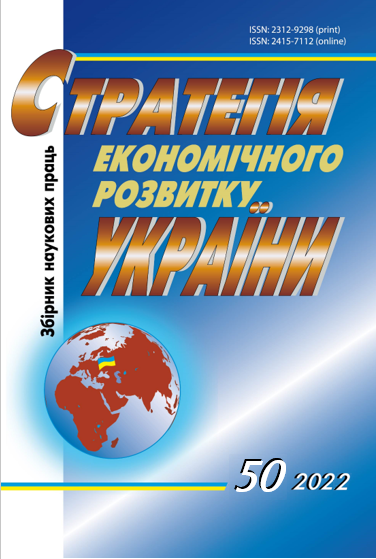ЄВРОПЕЙСЬКІ ЦІННОСТІ ТА ЕФЕКТИВНА БІЗНЕС-ВЗАЄМОДІЯ
DOI:
https://doi.org/10.33111/sedu.2022.50.032.044Ключові слова:
Україна, євроінтеграція, європейські цінності, організаційна культура, ХофстедеАнотація
Стаття має на меті виявити організаційні цінності в різних країнах Європи, використовуючи 6-D модель Хофстеде, і застосувати їх для реалізації найкращих стратегій ефективної взаємодії між українцями та рештою Європи, зважаючи на зобов’язання Європейського Союзу надати Україні членство у майбутньому. У цьому дослідженні порівнюються національні цінності та визначаються кластери країн, які мають подібні цінності щодо організаційної діяльності та структури, а також виявляється кореляція між цінностями кластерів та позиціями країн у рейтингу Європейської палати бізнесу. Стосовно результатів, у роботі встановлено, які країни культурно більше схожі на Україну, а також які цінності переважають у найуспішніших країнах. Нарешті, вказується на набір актуальних ідей та організаційних цінностей, на які повинні звернути увагу українські підприємства та організації в межах культурних рамок їхніх майбутніх партнерів з Європейського Союзу.
Посилання
“The European Commission recommends to Council confirming Ukraine, Mol-dova and Georgia’s perspectives to become members of the EU and provide its opinion on granting them candidate status”. (Press release). European Commision. 2022. https://ec.europa.eu/commission/presscorner/detail/en/IP_22_3790 (accessed 17.06.2022).
Wolczuk, K. “State building and European integration in Ukraine”. Eurasian Geography and Economics 60, no. 6 (2019): 736-754.
Lähdesmäki, T. “Rhetoric of unity and cultural diversity in the making of Euro-pean cultural identity”. International journal of cultural policy 18, no 1 (2012): 59-75.
Barker, K., Day, C., Day, D., Kujava, E., Otwori, J., Ruscitto, R., Smith, A., and Xu, T. “Global Communication and Cross-Cultural Competence: Twenty-First Century Micro-Case Studies”. Global Advances in Business and Communications Con-ference and Journal 6, no. 1 (2017): Article 5. http://commons.emich.edu/gabc/vol6/iss1/5 (accessed 15.05.2022).
Velez-Calle, A., Roman-Calderon, J. P., and Robledo-Ardila, C. “The cross-country measurement invariance of the Business Cultural Intelligence Quotient (BCIQ)”, International Journal of Cross Cultural Management 18. no. 1 (2018): 73–86.
Lewis, R. When cultures collide: Leading across cultures. Hachette UK, 2018.
Hofstede, G. “Dimensionalizing cultures: The Hofstede model in context”. Online readings in psychology and culture 2, no. 1 (2011): 2307-0919.
Javidan, M. and Dastmalchian, A. “Managerial implications of the GLOBE pro-ject: A study of 62 societies”. Asia Pacific Journal of Human Resources 47, no. 1 (2009): 41-58.
Hofstede Insights. Country comparison. (2022). https://www.hofstede-insights.com/country-comparison (accessed 13.05.2022).
Husserl, E. The Crisis of European Sciences and Transcendental Phenomenology. Northwestern University Press, 1970.
Berger, P. and Luckmann, N. The Social Construction of Reality. Anchor Books, 1966.
Bauman, Z. Culture as praxis. Sage, 1999.
Tchaïcha, J. D. and Davis, M. M. The impact of culture on technology and business: An interdisciplinary, experiential course paradigm. Journal of Management Education 29, no. 5 (2005): 738-757.
Guirdham, M. Culture and business in Asia. Bloomsbury Publishing, 2017.
Kiseľáková, D., Šofranková, B., Čabinová, V., and Onuferová, E. “Competitive-ness and sustainable growth analysis of the EU countries with the use of Global Index-es’ methodology”. Entrepreneurship and Sustainability Issues, 5(3) (2018): 581-599.
European Chamber. Best European Countries for Business. (2022). https://eucham.eu/best-european-countries-for-business-2020/ (accessed 13.05.2022).
Wu, J. Advances in K-means Clustering: A Data Mining Thinking. Springer Sci-ence and Business Media, 2012.
Pedregosa, F., Varoquaux, G., Gramfort, A., Michel, V., Thirion, B., Grisel, O., Blondel, M., Prettenhofer, P., Weiss, R., Dubourg, V., Vanderplas, J., Passos, A., Cour-napeau, D., Brucher, M., Perrot, M., and Duchesnay, É. “Scikit-learn: Machine Learn-ing in Python”. Journal of Machine Learning Research 12, no. 85 (2011): 2825-2830.
Jolliffe, I. T. Principal Component Analysis. Springer Science and Business Me-dia, 2013.
Dangeti, P. Statistics for Machine Learning. Packt Publishing Ltd, 2017.
Kaufman, L. and Rousseeuw, P. J. Finding Groups in Data: An Introduction to Cluster Analysis. John Wiley and Sons, 2009.
Tarek, A. Hands-On Machine Learning with scikit-learn and Scientific Python Toolkits. Packt Publishing Limited, 2020.
European Commission. The Mediterranean Region. (2022). https://ec.europa.eu/environment/nature/natura2000/biogeog_regions/mediterranean/index_en.htm (accessed 13.05.2022).
McSweeney, B. “Hofstede’s model of national cultural differences and their consequences: A triumph of faith-a failure of analysis”. Human relations 55, no. 1 (2002): 89-118.
Lifintsev, D., Fleșeriu, C., and Wellbrock, W. “A study of the attitude of Gen-eration Z to cross-cultural interaction in business”. Information and Media 86 (2019): 41-55.
European Council on Foreign Relations. Join forces: How to sustain public sup-port for Ukraine’s EU accession. (2022). https://ecfr.eu/article/join-forces-how-to-sustain-public-support-for-ukraines-eu-accession/ (accessed 13.05.2022).
Hasiuk, I., Darmanska, I., Mykhaskova, M., Pisotska, L., and Suhovirskyi, O. “Assessment of Sustainable Development of the Educational Sphere of Ukraine in the Paradigm of European Integration Processes”. Revista Romaneasca pentru Educatie Mul-tidimensionala, 14, no. 2 (2022): 136-155.
Yatsenko, O., Nitsenko, V., Karasova, N., James, H.S.Jr., and Parcell, J.L. “Re-alization of the potential of the Ukraine–EU free trade area in agriculture”. Journal of International Studies 10, no. 2 (2017): 258-277. doi: 10.14254/2071-8330.2017/10-2/18.
##submission.downloads##
Опубліковано
Версії
- 2022-07-11 (2)
- 2022-06-30 (1)


